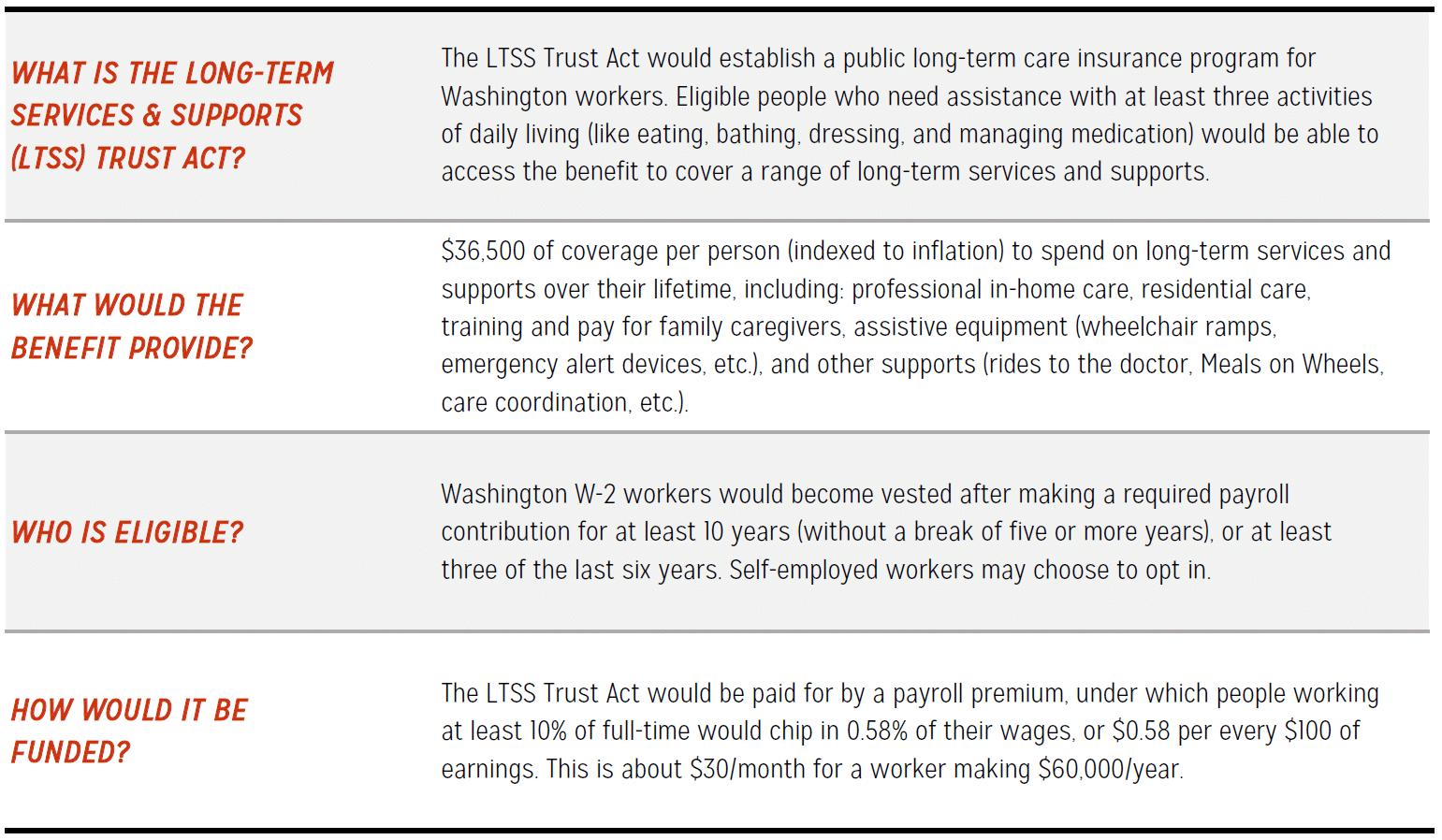State lawmakers are considering a groundbreaking proposal to put affordable long-term care within reach for Washingtonians. The Long-Term Supports and Services (LTSS) Trust Act would establish a first-in-the-nation public benefit to address the prohibitive cost of long-term care – helping to connect a growing segment of our state’s population with the care services they need (or will need in the near future), and supporting families to make ends meet. This is an innovation that Washingtonians need, and a significant step forward in public policy as our state’s population ages.
Every person deserves to age with dignity – to have access to the care they need, in the setting they choose, to stay safe and healthy as they grow older. Here in Washington, research indicates that a majority of people in our state will need some degree of long-term care during the course of their lives, as they move into their elder years or experience a disability. Many others will help provide care for a parent, partner, or other family member as they grow older or become ill, helping their loved one prepare meals, bathe, manage medication, and perform other activities of daily living.
But the ballooning cost of long-term services and supports represents an overwhelming challenge to people and families across our state – many of whom are forced to spend down their life savings to qualify for Medicaid coverage, reduce work hours (or leave jobs) to provide unpaid care, or forgo the critical services they need to stay healthy altogether.
An elder care crisis is looming
Washington’s population – as well as that of the broader United States – is aging rapidly. As members of the Baby Boomer generation reach retirement, people over 65 are on track to make up a larger share of the nation’s population than ever before.1 Here in our state, the population of seniors is projected to increase from 1.2 million in 2019 to more than 1.8 million in 2033.2 By 2034, Washington is projected to have more seniors than kids.3 On average, more than half (52%) of people who turn 65 today will develop a disability severe enough to require long-term care at some point.4 Given that the need for long-term care is on track to surge in the coming decades (with costs expected to rise alongside it), our state must act to ensure that all seniors and people with disabilities can access care and that caregivers are equipped to meet the growing demand.
The Long-Term Services and Supports Trust Act is a key part of the solution
The LTSS Trust Act would rightly bridge a gap in the current landscape of splintered, costly, and inadequate long-term care coverage. Here’s how it would work:
Click on graphic to enlarge.
With the LTSS Trust Act, Washington state lawmakers have the opportunity to make sure that families are not driven into poverty by the high and rising cost of long-term care. Currently, individuals and families are stretched thin trying to pay out of pocket or provide care by themselves, and they’re often forced to spend down their savings to qualify for Medicaid (which is available only to those who meet low-income and asset eligibility thresholds). The LTSS Trust Act would reduce the risk of aging into poverty for every person in our state, and especially for Washingtonians of color – who face structural and institutional barriers to economically secure retirement.
Because of centuries of racist policymaking, ongoing discrimination, and economic exclusion, people of color are less likely to have access to workplace retirement benefits, experience higher rates of economic insecurity, and have less wealth (and thus a smaller financial safety net) than their white counterparts. Ultimately, this means that people of color disproportionately struggle to cover the cost of long-term care. In particular, Latinx and Asian workers lack access to employer-based retirement plans: in Washington, only 62% of Asian workers and fewer than half (49%) of Latinx workers have access to such a benefit, compared to nearly 70% of their white counterparts.5 This exclusion from retirement benefits means that workers of color have less support and fewer opportunities to accumulate savings for their elder years. A universal long-term care benefit would begin to mitigate this inequality by connecting every worker in our state with the care they need – whether they are brown, Black, or white.
Aside from its promise to connect seniors and people with disabilities with the services they need, the LTSS Trust Act would also offer support to the networks of family members, friends, and elder care workers who do the around-the-clock work of ensuring that their patients and loved ones remain safe. This legislation stands to benefit both unpaid family caregivers and the paid home care and nursing facility workforce – groups that are mostly women, and disproportionately immigrants and women of color. Caregivers perform a vital function in our homes, communities, and economy overall, but their work is undervalued and underpaid. For too long they have borne the brunt of the expense of the long-term care industry, and without action our state will not be equipped with the strong, adequately sized workforce we need to meet the growing demand for care.
How we, as a state, care for our aging population and people with disabilities has significant implications for the health and vitality of our communities as a whole
Nearly two-thirds of older adults with long-term care needs living at home receive all help from unpaid family and friends.6 Family caregivers spend an average of 24 hours per week on caregiving activities, and nearly a quarter provide more than 40 hours of uncompensated care per week.7 At the same time, many unpaid caregivers (most of whom are women) balance full-time jobs and care for children of their own.8 Under this pressure – and with these competing demands – it’s not surprising that a majority of unpaid caregivers report cutting back work hours or even leaving their jobs, taking unpaid leave, or putting their own retirement funds at risk to make it work.9
The proposal is good for families and workers alike
Paid caregivers, too, are struggling to make ends meet. Across the U.S., home health workers face near poverty wages, few job-based benefits, and unpredictable scheduling, and disproportionate workplace harassment and abuse. More than one in four long-term care workers in Washington is an immigrant, and fully 83% are women. The long-term care workforce is also comprised disproportionately of Black and Asian workers, who make up a larger portion of long-term care professionals than workers overall. In Washington state, 11.5% of long-term care workers experience working poverty, while just 6.2% of all other full-time workers have incomes below 200% of the Federal Poverty Level (or $42,600 for a family of three).10 (And this estimate excludes the many long-term care workers that are unable to get enough work hours to be considered full-time because of erratic scheduling.) Difficult working conditions lead to high turnover and instability in this workforce – which is risky for people who need care, and drives up cost overall.
The LTSS Trust Act offers solutions for the challenges facing both of these groups. It would give unpaid caregivers a much-needed break by providing compensation and the option to obtain professional help. And it would improve the quality of paid caregiving jobs by requiring LTSS employers to meet certain standards in order to qualify for reimbursement from the program. This, in turn, would promote broad economic growth by boosting family incomes and stabilizing the care workforce.
How we, as a state, care for our aging population and people with disabilities has significant implications for the health and vitality of our communities as a whole. Washington has the opportunity to lead the nation with this groundbreaking proposal, and its wide-ranging benefits should make its passage common-sense. Lawmakers have the chance to improve not only the health of our seniors, but also the well-being of the community networks and professional workers that surround them. The LTSS Trust Act will at once advance equity and address a looming economic problem. This legislation is the right move for Washington families and workers, and it’s the right move for our state’s future.

